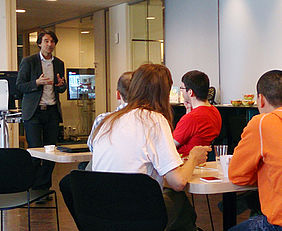Business Coach Raoul Stubbe, STING and lead for the EIT ICT Labs Stockholm Business Developer team, held a much appreciated crash course for potential startups as the final CLC lunch talk this spring. He posed seven major questions that should be answered when considering if your idea is worth the effort of starting a company or if the idea is better transferred, sold or patented.
Raoul Stubbe often gets the question on the recipe for success. The truth is that the majority of ideas don’t make it but understanding some fundamental things early can prevent unnecessary mistakes. In most cases he encourages those who are in doubt to start a company.
- It always takes some tweaking before getting the idea right, the team together, the financing solved etc but the experiences you gain – even if the company turns out to be a failure – is worth a lot.
Not all researchers are suited for or interested in driving a business concept. Raoul is unusual as a business coach since he started out as a researcher but became involved in business development and found it to be even more challenging. Understanding both the academic and business side is useful in providing the right support.
As important as a good idea is a good team, or even more. Raoul shared his experience that a well composed team would be a better asset than a good idea and a dysfunctional team. A good team will always come up with a better idea but a bad team can delay business evolution and ruin a good idea. Make sure that you share some basic values, that you have fun and passion for what you are doing.
Equally important is to understand the market where the product will be sold. Ideas that come from people who are working in established companies can often benefit from the startup agility whereas the larger institution need to focus on efficiency and satisfying existing customers. Developing new products may be difficult since the reward ratio is considered too low.
Where do we find the money to run a startup? Actually, most startups get going with income from sales according to Raoul Stubbe. His advice was to work on the bigger idea while start selling some smaller part or service. The startups who already have some financing or can state in their pitch to investors that they don’t primarily need money – are the ones that more likely will get it.
When should a project and team take the step and start a company? On average there is usually a pre-startup phase of 12 months before the need to create a company. In the academic world a long project phase is common. However, if there is a window of opportunity and competition is growing you may need to apply for funding or seek venture capital. This often requires a formalized company, in Sweden in the form of an Aktiebolag (AB) which costs 50 000 Swedish krona (6000 euro).
The paper work is the easiest part with extensive online support at Swedish Bolagsverkets website. Funding agencies Vinnova and ALMI are the main sources for ICT startups and STING is the main incubator. For students at KTH the student incubator at KTH Innovation can provide the initial and often crucial support.
If you really think you have an idea that is worth exploring further – apply for the STARTUP programme that starts at the Stockholm CLC on May 14. The crash course by Raoul Stubbe was a great teaser that clearly showed that there are more than seven questions to straighten out when starting up. Ten teams get the chance for a six weeks intensive course – apply here!







